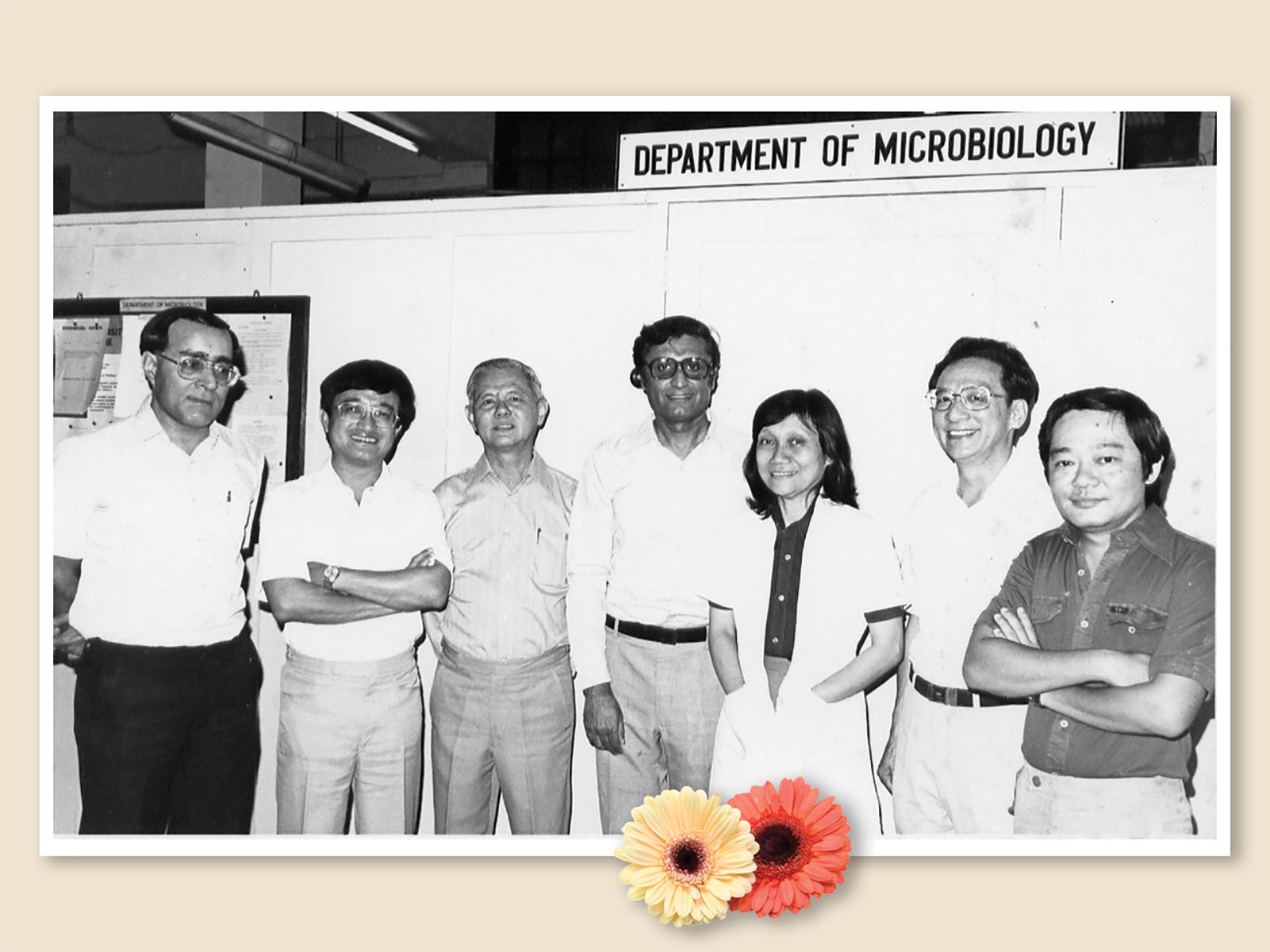
Issue 47
Aug 2023
SCIENCE OF LIFE

Stem cells have been modified to carry a therapy to treat companion animal patients with late-stage cancer, preserving good quality of life and extending their lives. This can potentially lead to a better understanding of cancer treatments and their use in human patients.
Dogs are humans’ best friends and it is always distressing for dog owners when their beloved pets contract terminal illnesses. Canine cancer is the leading cause of death in dogs and when they are diagnosed with late-stage or terminal illness, there are often no treatment options available. In a recent study, however, a novel form of chemoimmunotherapy has proven to be a promising treatment in altering the course of the dogs’ lives.
Scientists at the NUS Centre for Cancer Research (N2CR) Translational Research Programme (TRP) at the Yong Loo Lin School of Medicine, National University of Singapore (NUS Medicine), used stem cell precision engineering technology to treat the cancer-stricken canines.
In the study led by Associate Professor Too Heng-Phon and Dr Ho Yoon Khei from the N2CR TRP and Department of Biochemistry at NUS Medicine, the team modified Mesenchymal Stem Cells (MSCs), which are able to seek out cancerous tumours. These modified cells carry a potent ‘kill-switch’ (cytosine deaminase) that produces a high, localised concentration of a cancer killing drug (5-fluorouracil) in the tumour environment and subsequently induces anti-cancer immunity through a well-known cellular pathway involved in how our immune cells get rid of virus infected cells.
The development of this therapy to treat canine patients leads the team towards a better understanding of cancer treatments, as well as its use in human patients, as helping dogs with naturally occurring cancers provides valuable clues about human cancers1. This work has been scientifically peer reviewed2.
Assoc Prof Too said, “To repurpose stem cells for cancer treatment, it is usual to use viruses to introduce therapeutic genes into the cells. We have however, designed a non-viral gene delivery platform that introduces a high payload of therapeutic genes into the stem cells, to effectively destroy the out-of-control growing cancer cells. With this therapy that has been proven safe and demonstrated promising clinical benefits in animal patients, it is our hope to develop effective treatment options to help human patients with cancer as well, which can improve their health without compromising their quality of life and possibly extending it.”
Application of the technology on canine cancer patients
The technology developed by the NUS Medicine team was first applied on canine patients in Singapore in 2018, in a collaboration with Dr Jean Paul Ly, Chief Executive Officer and Founder, Animal Wellness. The research team thereafter collaborated with more veterinary partners and institutions, delivered the therapy to a total of 65 dogs, as well as two cats, with conditions such as perianal adenoma, lung metastasis, and recurrent sarcoma. These companion animals have no-option-left and late-stage cancers.
animal patients
56
signs of positive response, 2 animal patients remain cancer free, at least 30 months post treatment, while 46 patients showed good quality of life over two to 32 months
The patients first received the precision-engineered MSCs through direct tumour-site injections or through the blood stream, followed by the ingestion of oral pills containing a drug commonly used to treat fungal infection (5-flucytosine), over a few days. After a week, the cycle was repeated for two more weeks before the first course of treatment was completed. The team then monitored the condition of the patients and repeated the course where necessary.
Among the animal patients which received the treatment over a duration ranging from three to eight weeks, 56 showed signs of positive response, including 14 which showed full recovery from the treatment. Two animal patients remain cancer free, at least 30 months post treatment, while 46 patients showed good quality of life over two to 32 months, with the treatment. Through the course of treatment on all the animal patients involved in the study, there were no significant side effects observed—possibly due to the localised presence of the therapeutic cells which remain within the tumour environment.
Despite significant advancements in human cancer treatments, there is a massive lag in the development of oncology therapies for animal patients comparatively. Up until 2009, all animals were treated with generic human chemotherapy medicines on an off-label basis as there were no animal-specific anti-cancer agents approved by the US Food and Drug Administration (FDA).
Dr Lee Yee Lin, Founder and Head Veterinarian, Gentle Oak Veterinary Clinic in Singapore, who the research team collaborated with and is one of the authors of the study, said, “Therapies and advances in allopathic medicine are usually developed primarily for humans, before they are applied to animals. As part of the trials for this study however, dogs with cancer with no other viable treatment options available are the primary receivers of the therapy—and many of them showed promising results with an improvement to their quality of life. Hopefully the therapy can become one of the standard options available to dogs in the near future, so that more patients can benefit from it.”
One of the team’s collaboration partners, Associate Professor Antonio Giuliano, Department of Veterinary Clinical Sciences, City University of Hong Kong, will also be taking the therapy into animal clinical studies in 2023.
A possible, accessible and affordable option for human patients
The stem cell modification therapy differs from other cell and gene therapies that use viruses to introduce genes into cells. Instead of using virus, the modification involves using a chemical carrier, which is safer and faces less regulatory restrictions in the development of the treatment. Compared to other cell and gene therapies, the therapy design has a significantly shorter cycle and much lower costs of production, paving the way for a more accessible and affordable option for cancer patients in future.
Dr Ho Yoon Khei, Senior Research Fellow, N2CR TRP and Department of Biochemistry at NUS Medicine, and first author and lead scientist of the study, said, “Currently, we can develop this therapy for up to 18 human patients every week. Beyond results that have shown to benefit our companion animals, it is our hope to extend the therapy to human patients in the future and improve healthcare outcomes for those who have cancer—especially when they have no treatment options left.”
The research team is working with local and global health institutions to review the therapy’s safety and efficacy for veterinary medicine and discuss plans for clinical trials on human patients in Singapore and the Asia Pacific region. These are expected to begin in 2024.
https://www.cancer.gov/news-events/cancer-currents-blog/2019/comparative-oncology- dogs-cancer-clinical-trials.
Stem Cell Res Ther. 2022 Nov 14;13(1):519. doi: 10.1186/s13287-022-03198-z. PMID: 3637694.
More from this issue



